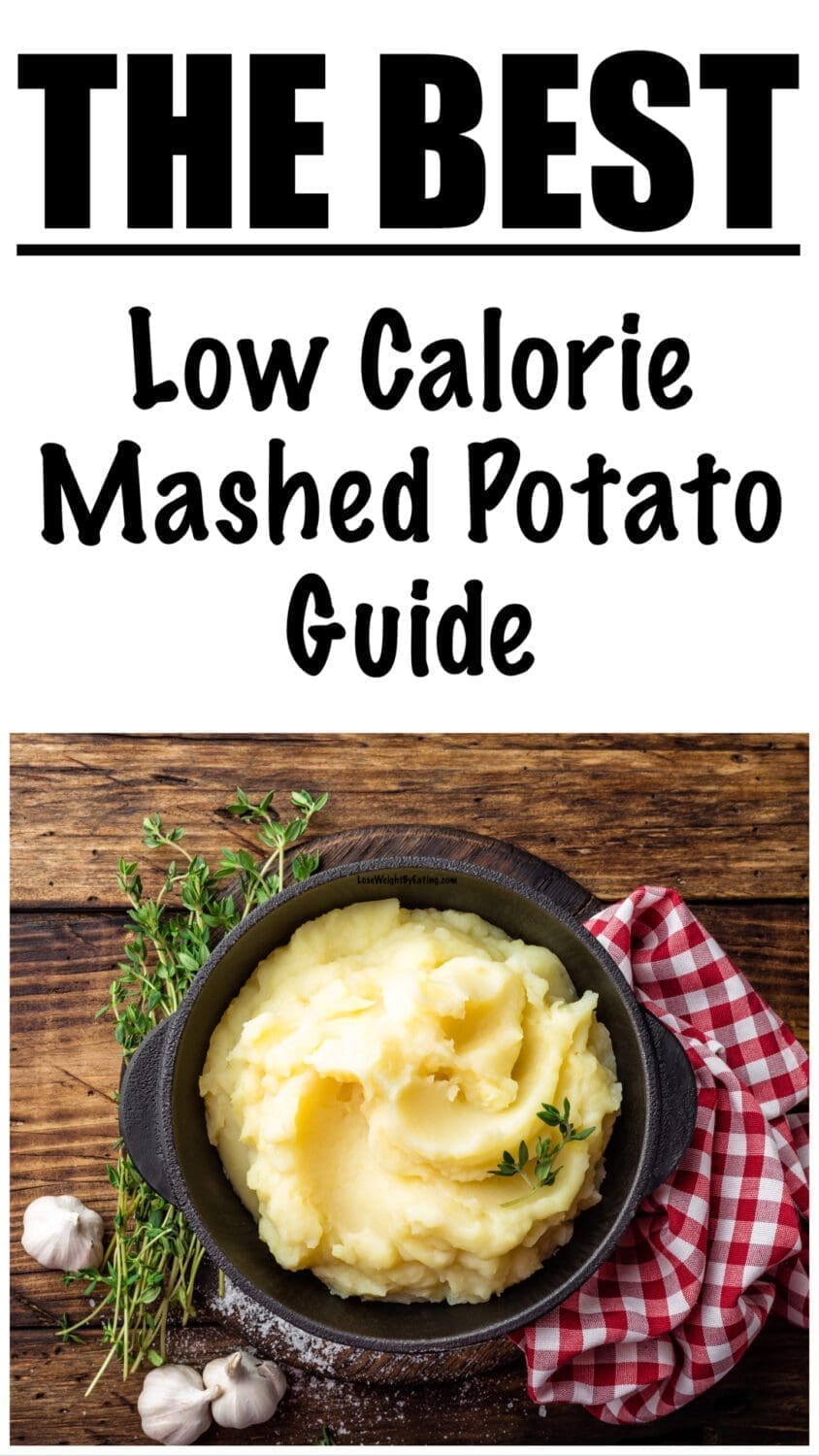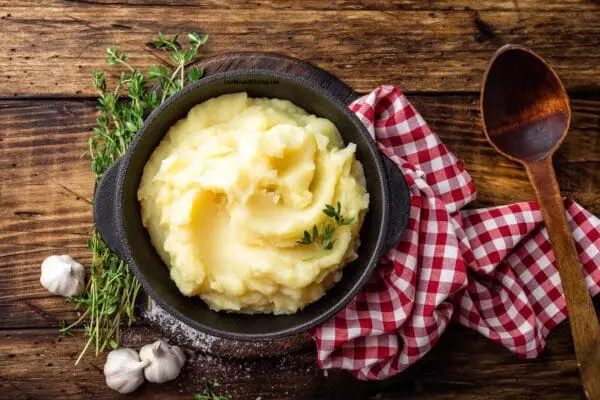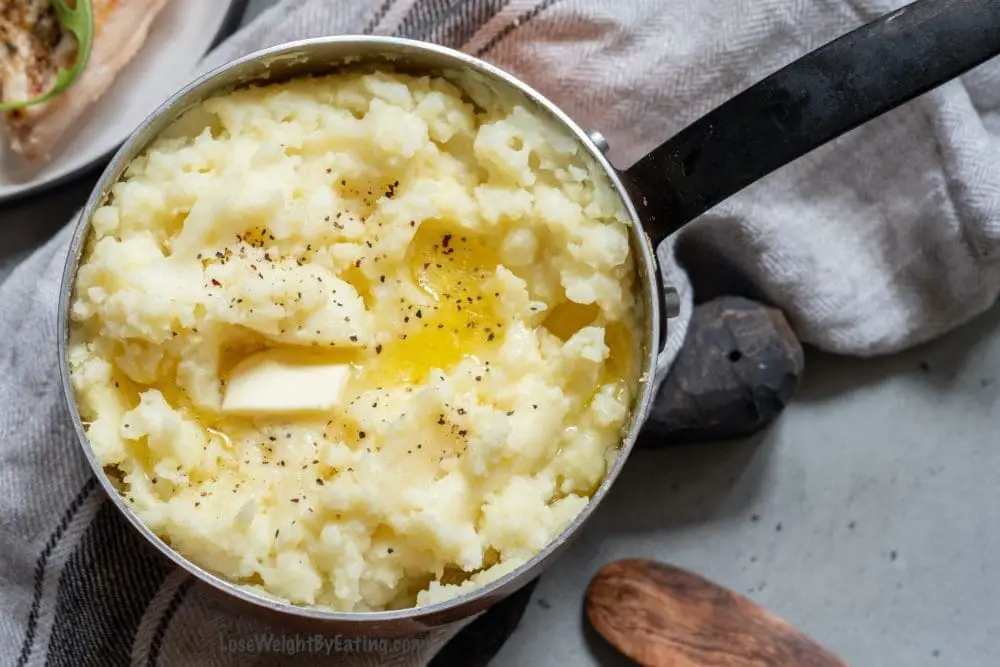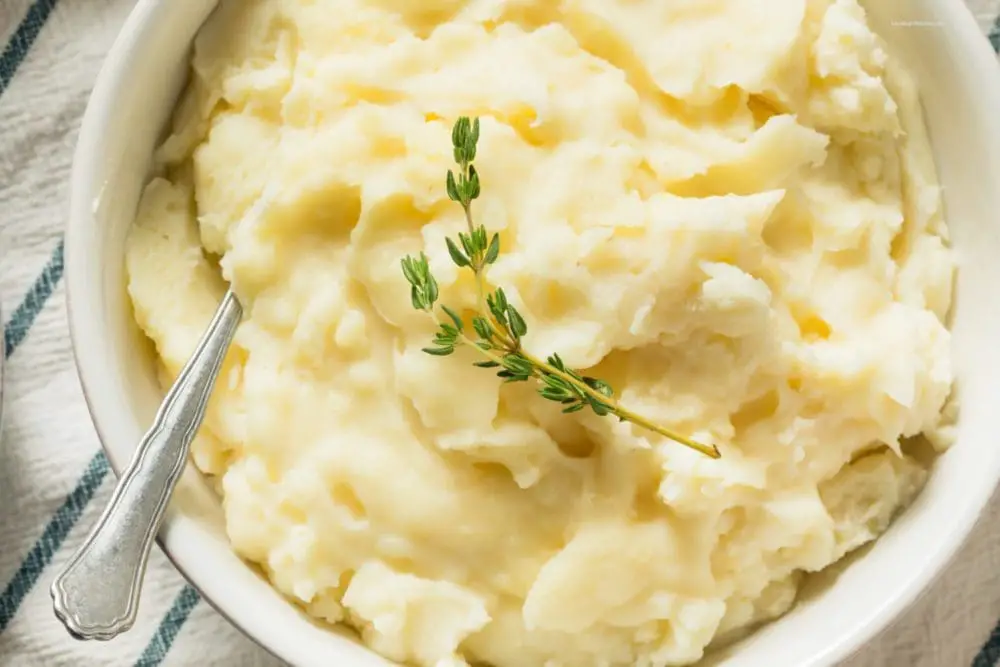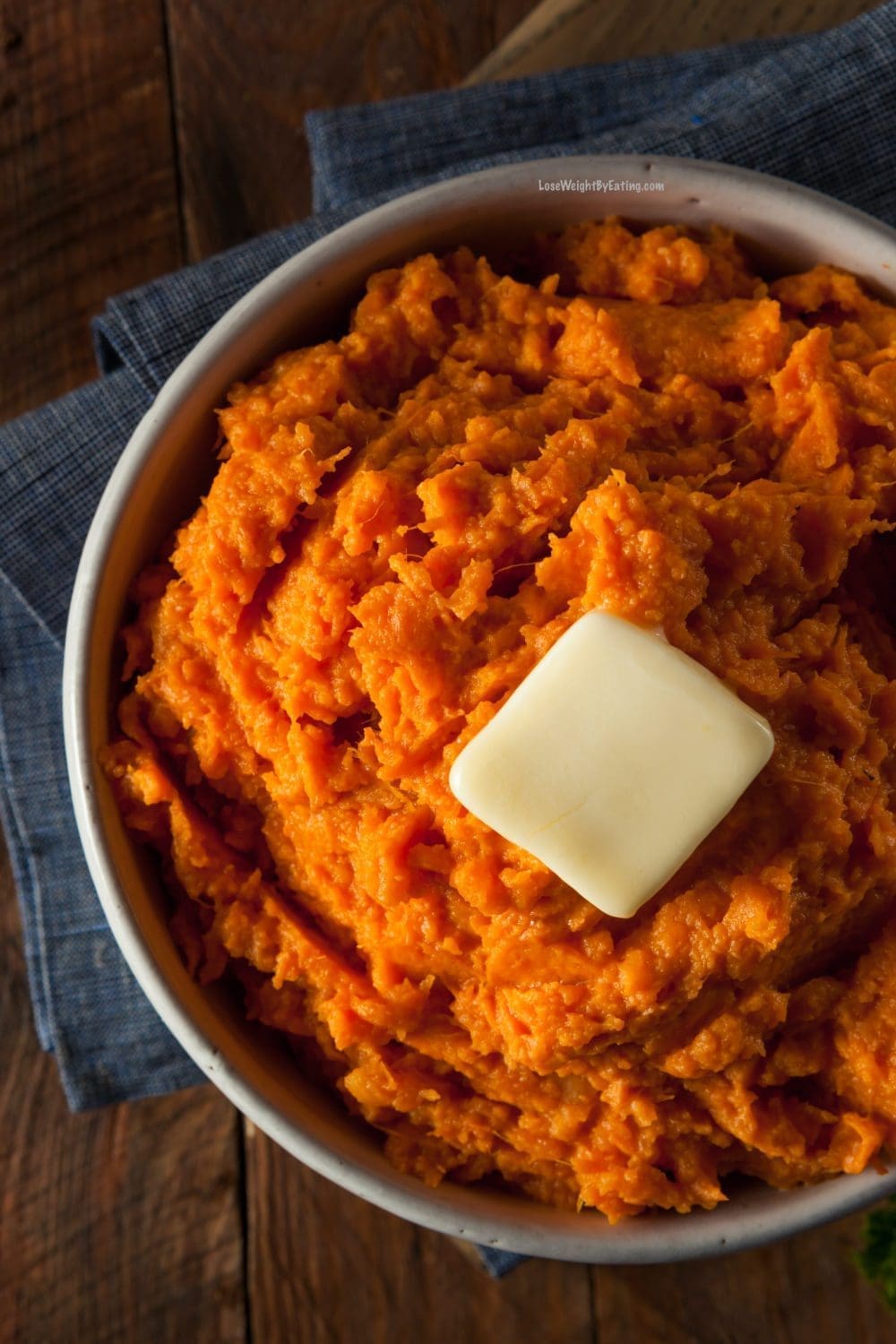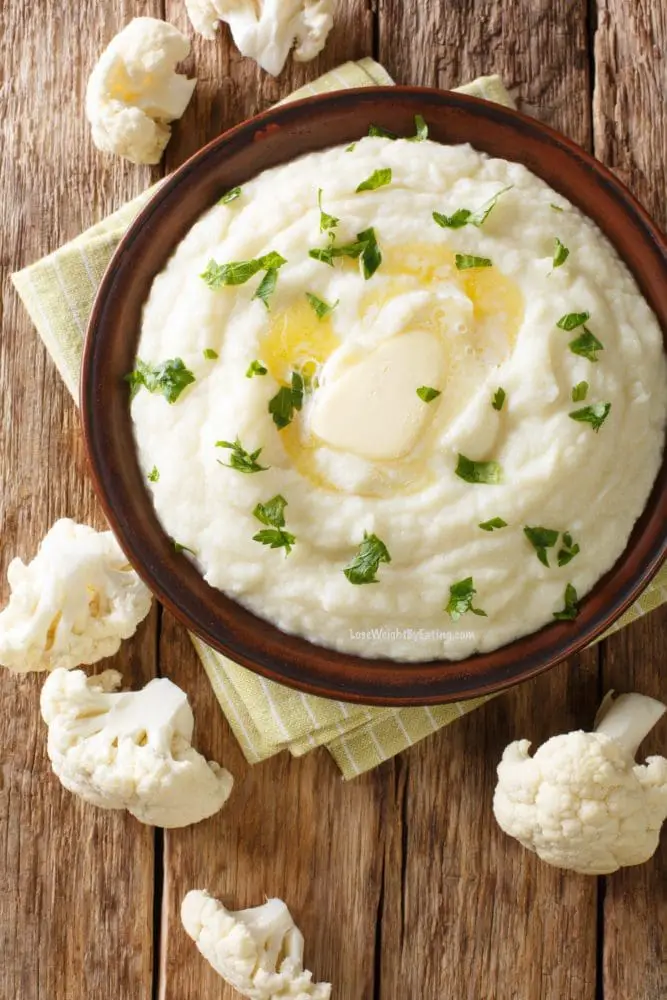Learn how many calories are in mashed potatoes, how to make them lower in calories and healthier. Plus find some low calorie recipes and tips to boosting nutrition and flavor without adding any calories.
Mashed potatoes are a beloved side dish that pairs perfectly with many meals. Whether you like them creamy, lumpy, or with added spices, there is no denying that mashed potatoes are a classic comfort food.
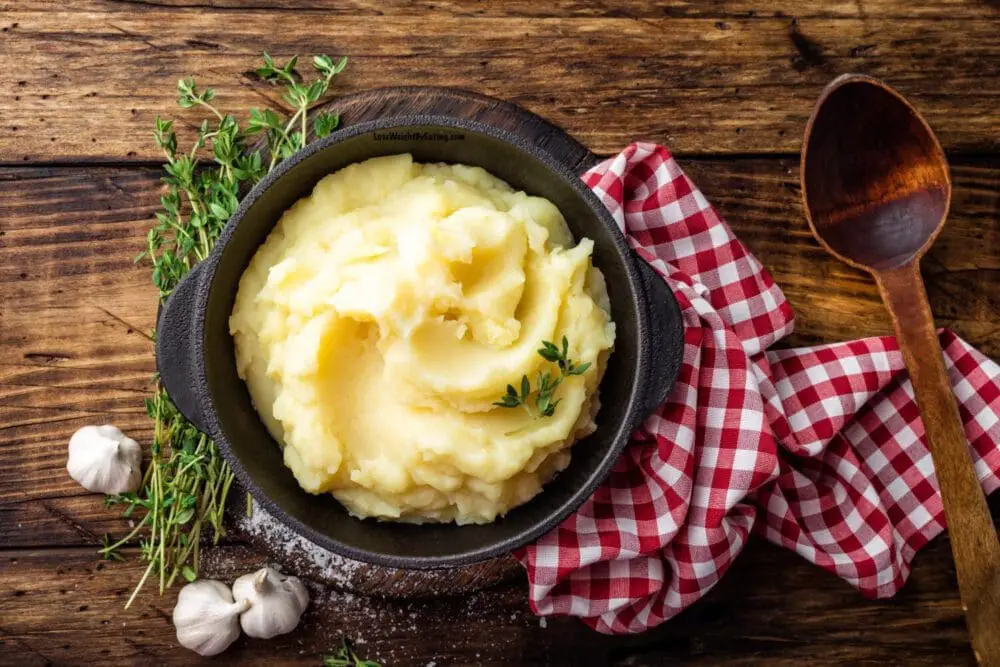

However, for those who are trying to watch their calorie intake, the question of “how many calories are in mashed potatoes?” can be a source of concern.
In this article, I’ll share the calories in mashed potatoes, including how they’re prepared and how they can fit into a healthy diet.
Are Mashed Potatoes Healthy?
Mashed potatoes can be a nutritious addition to your diet when prepared in a healthy way. Potatoes are an excellent source of vitamin C, potassium, and fiber, and can help to support healthy digestion and lower blood pressure. However, when mashed potatoes are loaded with high-fat and high-calorie ingredients like butter and cream, they can be less healthy.
To make mashed potatoes a healthier option, consider using low-fat or non-dairy alternatives to butter and cream. You can also add in other healthy ingredients like vegetables or herbs to boost the nutritional value of your mashed potatoes. For example, adding steamed cauliflower to your mashed potatoes can help to reduce the calorie count while increasing the fiber and vitamin content.
It’s also important to watch your portion sizes when consuming mashed potatoes, as it’s easy to overindulge in this tasty dish. A serving of mashed potatoes should be around 1 cup, which contains approximately 210-240 calories. By controlling your portion sizes and choosing healthier ingredients, mashed potatoes can be a nutritious and satisfying addition to your diet.
Mashed potatoes can be a healthy side dish when prepared in a healthy way and consumed in moderation. By choosing healthier ingredients and controlling your portion sizes, you can enjoy the comfort and flavor of mashed potatoes without compromising your diet goals.
Health Benefits of Mashed Potatoes
Mashed potatoes can be a healthy addition to your diet when consumed in moderation and prepared with nutritious ingredients. Here are some of the health benefits of mashed potatoes:
- Rich in nutrients: Mashed potatoes are a good source of several essential nutrients, including potassium, vitamin C, vitamin B6, and fiber. These nutrients support various bodily functions, including digestion, immune system function, and heart health.
- Promotes satiety: The fiber and protein in mashed potatoes can help you feel full and satisfied after a meal, which can prevent overeating and promote weight management.
- May lower blood pressure: The high potassium content in mashed potatoes can help lower blood pressure and reduce the risk of heart disease and stroke.
- May boost immunity: The vitamin C in mashed potatoes supports the immune system by promoting the production of white blood cells, which help fight off infections and diseases.
- May improve gut health: The fiber in mashed potatoes can promote healthy digestion and support the growth of beneficial gut bacteria, which can improve gut health and reduce the risk of chronic diseases.
- May support brain function: The vitamin B6 in mashed potatoes supports brain function by promoting the production of neurotransmitters, which are essential for cognitive function and mood regulation.
- May reduce inflammation: The antioxidants and phytonutrients in potatoes may help reduce inflammation in the body, which is associated with various chronic diseases.
To maximize the health benefits of mashed potatoes, consider incorporating healthy ingredients like vegetables, herbs, and low-fat dairy. Also, be mindful of portion sizes and avoid adding high-calorie toppings like gravy, butter, or cheese.
Preparing Mashed Potatoes
When it comes to calculating the calories in mashed potatoes, there are a few factors to consider.
Firstly, the type of potato used can impact the calorie count. For example, a medium-sized Russet potato has around 168 calories, whereas a medium-sized red potato has approximately 151 calories.
Additionally, the way the potatoes are prepared can also impact the calorie count. Adding butter, cream, or milk to your mashed potatoes can significantly increase the calorie count. On the other hand, using low-fat or non-dairy alternatives can help to reduce the calorie count.
10 Ways to Lower the Calories in Mashed Potatoes
Mashed potatoes are a delicious comfort food, but they can also be high in calories and fat. If you’re looking to reduce the calorie content of your mashed potatoes, here are 10 easy ways to make them healthier:
- Use low-fat or non-dairy alternatives to butter and cream, such as low-fat milk, Greek yogurt, or mashed avocado.
- Replace some of the potatoes with vegetables like cauliflower, turnips, or parsnips, which are lower in calories and higher in fiber.
- Use a potato masher or fork to mash the potatoes instead of an electric mixer or blender, which can create a smoother texture so you don’t need as much butter.
- Leave the skins on the potatoes, as they contain fiber and nutrients that are lost when peeled.
- Use herbs and spices like garlic, thyme, and parsley to add flavor to the mashed potatoes instead of high-calorie ingredients like cheese or bacon.
- Use low-sodium broth or stock instead of salt to flavor the mashed potatoes.
- Add sautéed mushrooms or onions to the mashed potatoes for added flavor and nutrition.
- Use a food scale to measure your portions of mashed potatoes and stick to one serving size.
- Avoid using high-calorie toppings like gravy, sour cream, or butter on top of the mashed potatoes.
- Make mashed sweet potatoes instead of regular potatoes for a lower-calorie and nutrient-dense alternative.
By following these simple tips, you can enjoy the deliciousness of mashed potatoes without worrying about the calorie content. Get creative in your kitchen and experiment with different healthy ingredients and cooking techniques to make your mashed potatoes a healthier and satisfying dish.
Calories in Mashed Potatoes
So, how many calories are in a serving of mashed potatoes? On average, a single serving of mashed potatoes (around 1 cup) contains approximately 210-240 calories.
However, this can vary depending on how the mashed potatoes are prepared. For example, a serving of mashed potatoes made with whole milk and butter can contain up to 350 calories or more.
Additionally, added ingredients such as cheese, bacon, or gravy can also contribute to the calorie count.
Mashed Potato Calories and Nutrition:
- One cup (210-240g) of plain mashed potatoes contains:
- Calories: 210-240
- Fat: 7-8g
- Carbohydrates: 32-36g
- Fiber: 2-3g
- Protein: 4-5g
- Vitamin C: 27-30% of the daily value (DV)
- Potassium: 15-20% of the DV
- Vitamin B6: 15-20% of the DV
- Iron: 6-8% of the DV
- Calcium: 2-3% of the DV
- Adding butter, cream, or cheese to mashed potatoes will increase the calorie and fat content significantly.
- Adding healthy ingredients like vegetables, herbs, and low-fat dairy can increase the vitamin and fiber content while decreasing the calorie content.
Healthy Mashed Potato Alternatives
If you’re looking to enjoy mashed potatoes without the high calorie count, there are several healthy alternatives to consider. Here are a few options to try:
- Cauliflower Mash: Replace some or all of the potatoes with steamed cauliflower for a lower calorie option. (recipe below!)
- Sweet Potato Mash: Swap out white potatoes for sweet potatoes, which are lower in calories and packed with nutrients. (recipe below!)
- Greek Yogurt Mash: Use Greek yogurt instead of cream or milk for a tangy and lower calorie alternative. (recipe below!)
Low Calorie Mashed Potato Recipes
These low calorie mashed potato recipes, and alternatives to mashed potato recipes are all reader favorite recipes here at Lose Weight By Eating! One is even from my best selling Instant Pot Cookbook!
Low Calorie Mashed Potatoes
This low calorie recipe tastes just like the traditional mashed potatoes you love, but with less calories, and a healthy protein boost thanks to greek yogurt.
This is a long time reader favorite and 5 star recipe. I know you’ll love it!
Low Calorie Instant Pot Mashed Potatoes
From my best selling Instant Pot cookbook, this low calorie recipe is just as good as the one above, but made extra easy in the instant pot.
I used tricks like adding potato water and boosting the flavor so no one will know this is a low calorie recipe.
Low Calorie Mashed Sweet Potatoes
So beautiful on any holiday table, this low calorie sweet potato dish is easy enough for weeknight dinners.
It’s low calorie and packed with flavor, and made vegan for those looking to eliminate dairy from their diet.
Low Calorie Cauliflower Mash Recipe
I love this mashed cauliflower recipe, and sometimes I make a “mash up” (pun intended) of the first low calorie potato recipe and this one. I just add 1/2 cauliflower and 1/2 potatoes to the pot and make the recipe 50/50.
But this recipe is 100% cauliflower mash. It’s low calorie and low carb, and so yummy you’ll want to make it weekly!
Frequently Asked Questions (FAQ)
Mashed potatoes themselves are not necessarily bad for you, but the way they are prepared can significantly impact their calorie count. Choosing healthier ingredients and preparing them in a healthier way can make mashed potatoes a nutritious and satisfying side dish.
Yes, you can include mashed potatoes in your diet in moderation. Choosing healthier ingredients and controlling portion sizes can help to keep the calorie count in check.
Try using low-fat or non-dairy alternatives to butter and cream, or adding in vegetables like cauliflower or sweet potato for a lower calorie option.
Final Thoughts
Mashed potatoes are a tasty and comforting side dish that can be enjoyed as part of a healthy diet.
By understanding the factors that impact the calorie count and choosing healthier alternatives, you can indulge in this classic dish without compromising your diet goals.
So, go ahead and enjoy a serving of mashed potatoes – just be mindful of how they’re prepared and how much you consume!
What to Read Next:


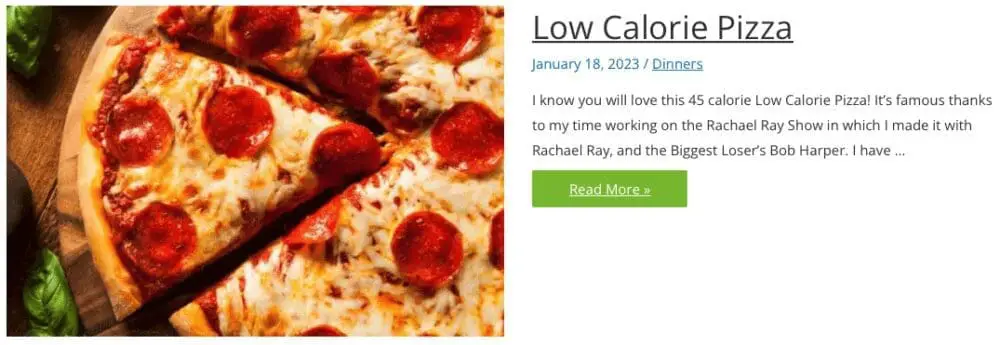



Lose Weight By Eating Cookbooks


Share this Low Calorie Guide:
